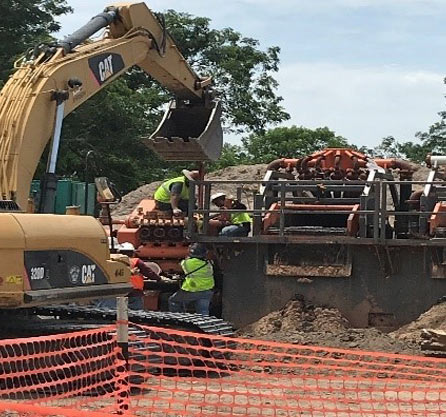RRC Continues Extensive Inspections of Major New Pipeline Project
July 23, 2020AUSTIN – Inspectors with the Railroad Commission of Texas are continuing critical inspections of the Permian Highway Pipeline (PHP), one of the largest pipeline projects under construction in Texas in 2020. Stretching more than 400 miles from the Permian Basin to the Houston area, the pipeline will bring West Texas’ natural gas to the world market.
Given the sheer scale of the PHP and its route through the sensitive Texas Hill Country, RRC has engaged in a comprehensive response to ensure that the pipeline is constructed safely in a manner protective of public health and the environment. Since March inspectors from two key RRC divisions, Oil and Gas and Pipeline Safety, have conducted more than 75 inspections and investigated close to 20 complaints related to the pipeline.
Currently RRC inspectors are on-site near the Pedernales River in Gillespie County as the pipeline operator, Kinder Morgan, works to excavate a pathway for the pipeline beneath the river.

Pedernales River inspection site – July


“Our inspectors have been hard at work, even during the COVID-19 pandemic, to ensure Kinder Morgan is compliant with Commission rules that are in place to protect public safety and natural resources,” said RRC Executive Director Wei Wang. “In addition to the all-hands efforts within the agency, we are also in contact with resident groups and the company as construction progresses. When it is complete, this pipeline will add vital capacity to convey natural gas, which in turn will also help ongoing efforts to further reduce flaring in West Texas.”
New pipelines are important to efficiently and safely transport large amounts of natural gas and oil. The Texas Pipeline Association estimates that a 20-inch pipeline running 50 miles can replace 1,650 tanker trucks carrying oil on the road. Pipelines also help reduce flaring by alleviating potential backing up of supply at the point of production.
RRC Oil and Gas inspectors have been at construction sites to ensure the operator has been compliant with agency rules to prevent the pollution of surface and groundwater resources.
Oil and Gas Field Operations staff also issued a notice of violation related to a drilling fluid spill that occurred in the spring.
Pipeline Safety inspectors have conducted multiple inspections of pipeline installation and pipe yards. The inspections include but are not limited to welding, pipe transportation procedures, coating thickness inspections, backfilling of trenches; safety equipment operability, and materials records.
The PHP is expected to be complete in early 2021
About the Railroad Commission:
Our mission is to serve Texas by our stewardship of natural resources and the environment, our concern for personal and community safety, and our support of enhanced development and economic vitality for the benefit of Texans. The Commission has a long and proud history of service to both Texas and to the nation, including more than 100 years regulating the oil and gas industry. The Commission also has jurisdiction over alternative fuels safety, natural gas utilities, surface mining and intrastate pipelines. Established in 1891, the Railroad Commission of Texas is the oldest regulatory agency in the state. To learn more, please visit https://www.rrc.texas.gov/about-us/.




